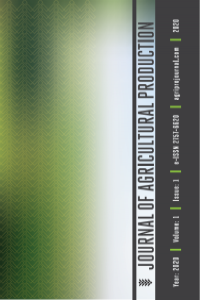Abstract
Soft rot is a disease that cause substantial economic losses in potato production. Pectobacterium carotovorum is known as one of the most common soft rot causative agents and the disease has not effective control methods being developed yet. In this study the effect of 3 different bacterial isolates of Bacillus megaterium (B60d, TV6D, TV91C), 2 of Paenibacillus polymyxa (Ç9, TV12E), 2 of Bacillus subtilis (TV6F, TV17C), 1 of Pantoea agglomerans (B79), 1 of Agrobacterium radiobacter (A16), 1 of Bacillus megaterium gc. subgroup A (FDG161), 1 of Bacillus atrophaeus (FD1), 1 of Pseudomonas fluorescens biotype F (FDG37) and 1 of Bacillus pumilus (TV3D) were tested against 5 pathogenic bacterial strains of P. carotovorum subsp. carotovorum (F37, F680, F741, F331, F742), using dual culture method in in vitro conditions. The most effective bacterial isolate against strains Pectobacterium were P. carotovorum F37 + Bacillus megaterium B60d (55,00 mm) isolate, followed by P. carotovorum F680 + Bacillus megaterium B60d (44,00 mm) and P. carotovorum F742 + Bacillus megaterium B60d (39,33 mm) isolates. Therefore, Bacillus megaterium has a promising biocontrol activity against tested plant pathogenic bacteria under in vitro conditions.
References
- Aizawa, S.-I. (2014). Pectobacterium carotovorum - Subpolar Hyper-Flagellation. In The Flagellar World (pp. 58-59).
- Bender, C., Malvick, D., Conway, K., George, S., & Pratt, P. (1990). Characterization of pXV10A, a copper resistance plasmid in Xanthomonas campestris pv. vesicatoria. Applied And Environmental Microbiology, 56(1): 170-175.
- Cooksey, D. A. (1990). Genetics of bactericide resistance in plant pathogenic bacteria. Annual reviews Phytopathol, 28: 201-219.
- FAO. (2008). Food and Agriculture Organization. Retrieved from http://www.fao.org/faostat/en/#rankings/countries_by_commodity. Date Accessed: 23.12.2018.
- Jeong-A, L., Samnyu, J., Dong Hwan, L., Eunjung, R., Kyusuk, J., Changsik, O., & Sunggi, H. (2013). Biocontrol of Pectobacterium carotovorum subsp. carotovorum Using Bacteriophage PP1. Microbiol Biotechnol, 23(8): 232-955.
- Marquez-Villavicencio, M. d., Groves, R. L., & Charkowski, A. O. (2011). Soft rot disease severity is affected by potato physiology and Pectobacterium taxa. Plant Disease, 95: 232-241.
- Mota, M. S., BauerGomes, C., Souza Júnior, I. T., & Moura, A. B. (2016). Bacterial selection for biological control of plant disease: criterion determination and validation. Brazilian Journal of Microbiology, 48(1): 62-70.
- Ngadze, E. (2012). Identification and control of potato soft rot and blackleg pathogens in Zimbabwe. Department of Microbiology and Plant Pathology. Zimbabwe: Doctorate thesis, University of Pretoria.
- Rahman, M. M., Khan, A. A., Mian, I. H., Akanda, A. M., & Alam, M. Z. (2017). Effect of some chemicals on incidence of poato soft rot disease in Bangladesh. Bangladesh Journal Of Scientific And Industrial Research, 2(52): 135-140.
- Schisler, D., & Slininger, P. (1997). Microbial selection strategies that enhance the likelihood of developing commercial biological control products. Journal of Industrial Microbiology & Biotechnology, 19: 172-179.
- Seebold, K. W. (2014). Blackleg & Bacterial Soft Rot of Potato. University of Kentucky College of Agriculture, Food and Environment, Plant Pathology Extension, 18: 2.
Details
| Primary Language | English |
|---|---|
| Subjects | Agricultural Engineering (Other) |
| Journal Section | Research Articles |
| Authors | |
| Publication Date | December 31, 2020 |
| Submission Date | December 17, 2020 |
| Published in Issue | Year 2020 Volume: 1 Issue: 1 |


